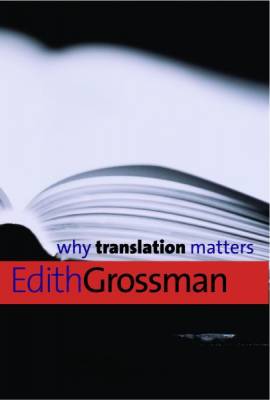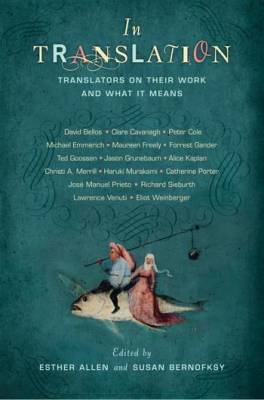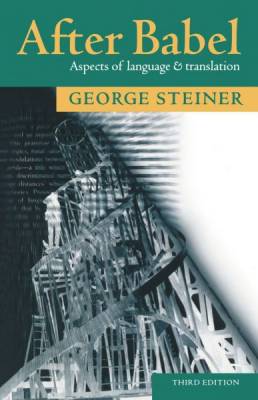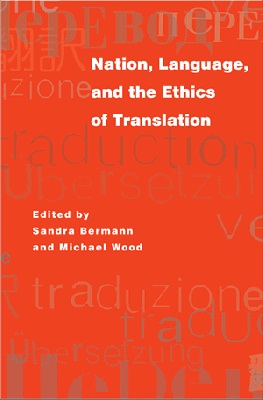
This is a book by Edith Grossman an American Spanish-to-English literary translator who is praised for her distinguished translation of Spanish literature. Published in 2010, why translation matters argues for cultural importance of the translation and for a more encompassing and nuanced appreciation of the translator’s role. In her introduction, Edith Grossman writes, “My intention is to stimulate a new consideration of an area of literature that is too often ignored, misunderstood, or misrepresented.” According to Edith in this book, translation has unsurpassable importance as she writes; “Translation not only plays its important traditional role as the means that allows us access to literature originally written in one of the countless languages we cannot read, but it also represents a concrete literary presence with the crucial capacity to ease and make more meaningful our relationships to those with whom we may not have had a connection before. Translation always helps us to know, to see from a different angle, to attribute new value to what once may have been unfamiliar. As nations and as individuals, we have a critical need for that kind of understanding and insight. The alternative is unthinkable.”
While translation has been perceived differently by different people, reading this book makes you understand and appreciate translation services as the art that is very important rather than being often ignored, misunderstood or misrepresented.
In Translation

This is an interesting book by Esther Allen. Published in 2013, In Translation has the most comprehensive miscellany of perspectives on translation to date; this compendium highlights writings by some of the world’s most skilful writers and translators, including that of the famous Japanese writer Haruki Murakami and others. ”While discussing the process and possibilities of their art, they cast translation as a fine balance between scholarly and creative expression. The volume provides students and professionals with much-needed guidance on technique and style, while also affirming for all readers the cultural, political, and aesthetic relevance of their work. These essays focus on translations to and from a diverse group of languages, including Japanese, Turkish, Arabic, and Hindi, as well as frequently encountered European languages, such as French, Spanish, Italian, German, Polish, and Russian. Contributors speak on craft, aesthetic choices, theoretical approaches, and the politics of global cultural exchange, touching on the concerns and challenges that currently affect translators working in an era of globalization”.
According to John Biguenet the co-editor of The Craft of Translation and Theories of Translation, this is an essential addition to the canon of translation studies, offering fascinating insights about the role and the work of the translator. Anyone interested in the making of literature will want this book.
After Babel: Aspects of Language and Translation

After Babel is one of the oldest linguistic books written by literary critic George Steiner. First published in 1975 by Oxford University Press in the United Kingdom, this book talks about what George Steiner termed as the “Babel problem” of multiple languages. Steiner digs deep to find out the creation of thousand of languages. Peter Bush director of the British Centre for Literary Translation at the University of East Anglia described this book as a “pioneering work which revealed all communication as a form of translation, and how central translation is to relations between cultures”. Steiner believes that translation is the pivot point of every communication as he states “To understand is to decipher. To hear significance is to translate.” This book has gone through the second and third editions. I am much convinced that this book is worth giving a dot of your time to read
Nation, Language, and the Ethics of Translation

This book by Sandra Bermann and Michael Wood was published in 2005. This book immerses itself into the debate that looks at translation as ”an art beyond the technicalities of converting one language into another and beyond conventional translation theory”. According to this book, ”With new technologies blurring distinctions between “the original” and its reproductions, and with globalization redefining national and cultural boundaries, “translation” is now emerging as a reformulated subject of lively, interdisciplinary debate. It covers an exceptional range of topics, from simultaneous translation to legal theory, from the language of exile to the language of new nations, from the press to the cinema; and cultures and languages from contemporary Bengal to ancient Japan, from translations of Homer to the work of Don DeLillo”.
The book covers four sections which include; “Translation as Medium and across Media,” “The Ethics of Translation,” “Translation and Difference,” and “Beyond the Nation”. With vast contributors, the book therefore ”provides a comprehensive view of current thinking on nationality and translation, one that will be widely consulted for years to come”
Found in Translation

This is the most important and educative book that everyone ought to read and perhaps own a copy. Authored by Nataly Kelly and Jost Zetzsche, found in translation discusses the relevance of translation in shaping human life and transforming the world. It looks at how translation goes beyond obvious things such as politics and global business but affects everyone personally. According to the authors of this book, translation affects humans by the books they read, movies they watch, food they eat, favourite sport teams to them, the opinions they hold dear, the religion they practice as well as their looks and love life
From inside of this book the writers state that ”Translation influences everything from holy books to hurricane warnings, poetry to Pap smears. It’s needed by both the masses and the millionaires. Translation converts the words of dictators and diplomats, princes and pop stars, bus drivers and baseball players. Translation fuels the global economy, prevents wars, and stops the outbreak of disease. From tummy tucks to terrorist threats, it’s everywhere”.
This book therefore helps understand how translation makes everything around your life possible
